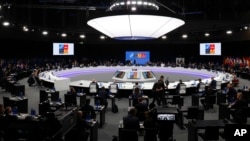An uptick in military spending by NATO allies is likely to pose a significant challenge to Russia's efforts at weakening NATO's influence, analysts say.
At the end-of-June Madrid summit, NATO Secretary-General Jen Stoltenberg said allies have committed to the 2% minimum - which he described as ''a floor and not a ceiling'', with 19 members having pledged to meet that goal by 2024, the Associated Press reported.
Rafael Loss, an analyst focusing on German and European foreign and security policy told VOA that the summit put European and North American allies on a stronger footing to continue support for Ukraine in its self-defense. He said there were some agreements to extend Western military, political and economic support to Ukraine.
''In light of the war in Ukraine," he said, "NATO allies have realized that its moderate posture on Russia was no longer sufficient and that a more substantial forward presence and a potential surge presence - like surging forces, was needed to deter Russia's aggression against NATO territory."
Loss also said such moves are needed "To maintain NATO cohesion and assure NATO allies like the Baltic states that are most exposed to Russia.''
Alissa de Carbonnel, at the International Crisis Group in Brussels told VOA that Russia's goal of countering NATO expansion has clearly failed. She said the Madrid summit provided the perfect platform for a united front against the Kremlin's aggression.
''There was a decision in Madrid to reinforce deployment in the Eastern flank and a multi-fold increase on the number of troops that are ready on high alert for rapid response. All of these are things that Russia and (Vladimir) Putin said he was trying to avoid'', she said.
Loss commended NATO for sticking to its plans of not sending troops into Ukraine to help the country's armed forces. ''That's quite a sensible position to take because escalation is quite unpredictable in military conflicts.''
But he lauded NATO members' weapons shipments to Kyiv, saying ''The provision of more sophisticated artillery systems to Ukraine by Western countries is making planning and execution of Russia's attack much more difficult, and this increases the cost on Russia so that the Kremlin will be willing to engage in earnest negotiations to cease hostilities."
The ICG's de Carbonnel stated ''Peace talks (between Russia and Ukraine) appear to be impossible at the moment because they're so far from where things stand on the battlefield.'' She added ''It appears increasingly likely that there will be a stalemate as in protracted conflicts. But the key thing is the continued support of Ukraine by NATO allies to avoid escalation.''
Analyst Loss says that support should be stepped up in sophistication.
''Maybe we should revisit earlier decisions of NATO allies to not provide Ukraine (with) armed vehicles, tanks, infantry fighting vehicles, armored personnel carriers," he said, "because it is difficult for Ukraine armed forces to move troops in combat areas when most of them get injured and killed by artillery shrapnel.''










